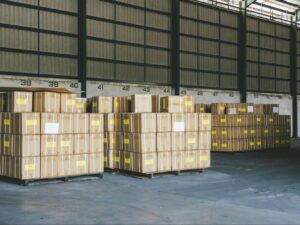Our title question is one with an answer that has some subtleties and needs some explanation – what is B2B fulfillment? There are a lot of terms in the fulfillment industry and more than a few acronyms. In this writing, we will attempt to differentiate between the different types of fulfillment – B2B, B2C, and D2C. Fulfillment companies handle all three types of commerce.
Commerce between one business and another is business to business or B2B (sometimes written as b2b fulfillment.)
The fulfillment of the business-to-business orders will be in response to a commercial exchange between two business entities. One type could be a wholesale business selling to a retail business. For example, a company that sells office furniture, software, or paper to other businesses would be an example of a B2B company. Fulfillment centers that serve these sales are B2B fulfillment centers.
But of course, wholesale businesses may, and often do, offer retail and eCommerce as well. The handling of these orders by the fulfillment company will be a significantly different process. Exactly what is B2C fulfillment? It is when a business, whether wholesale, retail brick, and mortar, or eCommerce, sells to a single consumer – business to consumer.
What About B2B Storage in the Warehouse?
There are numerous storage options for B2B clients and fulfillment centers will tailor these options to the specific needs of the client. These will include options from racking and stacking to palletizing and picking.
In addition, the warehouse management system (WMS) will allow for real-time tracking of inventory. Comparing B2B with B2C storage, they are very different, they require entirely different processing. One thing that is the same… both will be able to do real-time tracking.
How about in the eCommerce outsourcing world? What is the difference between B2B and B2C eCommerce? eCommerce is relatively the same – once again B2B stands for business to business and B2C is business to consumer. B2B eCommerce companies sell to other businesses, and B2C sells to individual consumers.
There is another type of eCommerce sales called D2C – direct to consumer. It is very similar to B2C and is sometimes used synonymously. One example is when a company chooses to receive eCommerce orders from single customers and fill them directly in-house.
This would be direct to the consumer (D2C). A fulfillment company can be engaged to do D2C fulfillment for the business as well.
As a rule, B2C orders involve single items or limited quantities of products. B2B orders are quite different. They are bulk orders involving large quantities of items. There could be a wholesaler who orders truckloads of goods and the fulfillment company must have the capacity to handle that. Orders can also be for pallets or case lots, and orders can involve many different SKUs. Much depends on the type of product.
What Does B2B Mean in a Warehouse?
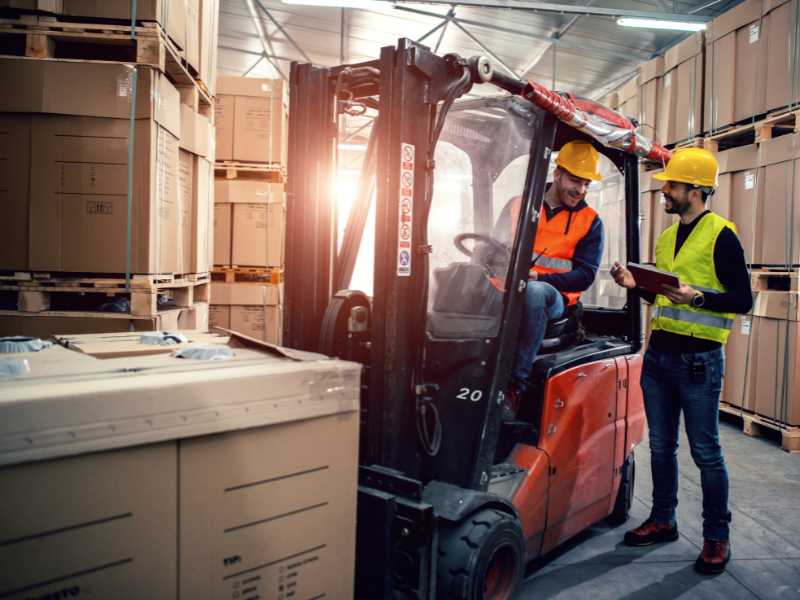
The team that handles b2b fulfillment must be able to route bulk orders from superstores and wholesale companies to retail stores and boutiques and meet the requirements of both. They must pay strict attention to routine guides and comply with the end customer’s requirements.
Shipments that are delivered to stores that are brick and mortar, or distribution centers, will contain different SKUs, and they will have bills of lading and other forms of paperwork, which is not the case with B2C or D2C. Also unlike B2C they will be palletized or may contain numerous boxes.
Generally, B2B order fulfillment will be much larger and less frequent. B2C orders will have one or a few items, being shipped to a residence. Because they are larger and bulkier, the shipping and logistics for B2B are far more complex. They will mostly be shipped via freight. If the items are small enough to be packed in boxes they can be shipped via parcel. Shipping costs would then be negotiated with the carriers.
There are industry regulations on shipping products from business to business. B2B orders must comply with more complicated regulations, especially when it comes to EDI (electronic data interchange). B2B fulfillment is subjected to specific industry and product type regulations that do not apply to B2C and D2C. Because B2B shipments can include dangerous materials, machinery, heavy items, or hazardous items, they are bulk orders subjected to rules and regulations.
Business to Business vs Business to Consumer Fulfillment
There are huge differences in fulfillment, in all areas, between these types of sales. This is likely the reason why some fulfillment companies limit the amount of B2B, and some don’t provide it. In addition to the warehousing and fulfillment that we have already described, there are other differences.
B2B involves more needs-based purchasing and less market-driven buying. In business-to-consumer buying, we see marketing tactics like add-ons, low shipping costs, or free shipping. This doesn’t happen in business to business.
B2B is not concerned with optimizing the customer’s buying experience as is B2C and D2C. For the most part, B2B buyers operate around tight parameters in their purchasing and for them, customer satisfaction is achieved with a smooth flow, great communication, order accuracy, and of course the lowest possible shipping costs.
There is even more complexity. When a single customer is the buyer, there is no need for consulting with others. In b2b fulfillment, the purchasing of the products will need analysis, discussion, and approvals within different departments of the business that is buying. B2C consumers can make impulse buying or make a purchase based on emotion and this is not the case with B2B.
B2B buyers will spend more time researching and looking at long-term sourcing recommendations. These purchases are high-value so any errors are magnified. Also, B2B buyers have to consider the lifecycle of the products and they often make repeat purchases. They are making decisions for an entire company so they don’t want missteps.
On the other hand, B2C can make missteps that are much less impactful. A major differentiating factor is that in B2C, a consumer can only buy once, or even return the products.
Fulfillment centers need to have the right infrastructure and expertise to handle B2B. Warehouses must have the technology needed, which means a robust Warehouse Management System (WMS) for real-time tracking of the inventory that allows the business to see the inventory levels at all times.
The most advanced software will integrate warehouse systems and automate various tasks. Some warehouses are incorporating robotics as well. The system can track inventory levels and generate purchase orders when stock levels run low.
A transportation management system will analyze and choose the proper shipping routes based on client preference and cost. The appropriate IT infrastructure has to be in place to handle B2B.
What Does B2B Stand for in Logistics & the Supply Chain?
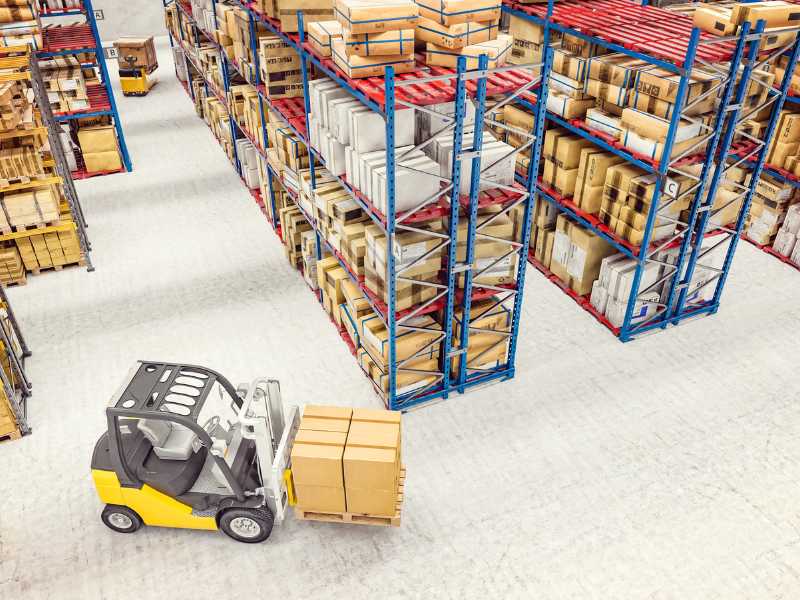 In B2B logistics and shipping, we are looking at bulk orders and with B2C and D2C we are looking at single packages. The B2B industry involves shipping wholesale orders of goods to other businesses. The fulfillment company’s services take care of the entire, sometimes complex, shipment process.
In B2B logistics and shipping, we are looking at bulk orders and with B2C and D2C we are looking at single packages. The B2B industry involves shipping wholesale orders of goods to other businesses. The fulfillment company’s services take care of the entire, sometimes complex, shipment process.
At the fulfillment company, B2B orders can be directed both toward distribution centers and brick-and-mortar stores and they can be multi-box or palletized. Shipments to brick-and-mortar stores will likely contain a variety of SKUs. Orders that are palletized will likely contain many boxes; they’ll be bulk orders destined for distribution centers. B2B orders will often have Bills of Lading or other lengthy paperwork associated with them.
In B2B, businesses doing the buying are stocking up on wholesale products either to sell them through a retail store or sell the products through eCommerce, to multiple channels, outsourcing the fulfillment and several processes such as returns, value-added, and so forth. The complexity of traditional logistics companies in handling B2B, warehousing and shipping wholesale orders, and providing customer service, is the reason some 3PLs limit their B2B business.
B2C fulfillment often focuses on shipping speed, as single customers will expect speedy delivery, including 2-day and free shipping. Fulfillment centers have many processes to speed up B2C fulfillment and satisfy their clients. On the other hand, speed is not the highest priority with B2B fulfillment.
B2B is much more focused on accuracy, the certainty of the shipment, and fulfilling all requirements and paperwork. Speed is important but it isn’t a focus as it is in B2C. The B2B logistics and supply chain are built upon good trust with the vendors, fulfillment optimized for cost-effective benefits, shipping that is reliable and quick, and deliveries arriving at guaranteed dates and times.
Why Is B2B Fulfillment Important?
B2B fulfillment fills an essential need in commerce. Wholesale businesses use B2B fulfillment to satisfy business consumer customers who sell online or in brick-and-mortar stores. A better question might be, what is important to make B2B fulfillment work? There are many answers but at the top, to make it work, excellent technology is needed.
The technology has to be top-notch with the WMS, and shared technology between the sellers, fulfillment company and buyers must be top-notch. EDI (electronic data interchange) capacity is vital. Customers will want updates on their orders and also tracking when their orders are in transit. For B2B customers it is essential to get relevant updates on the orders.
Overall, tracking the inventory is crucial to B2B fulfillment. This is one area where B2B and B2C have the same needs.
When it comes to customer satisfaction, the B2B customer is of course quite different from the B2C customer. The B2C customer would connect with a customer care team member and discuss a particular issue concerning a single order. The B2B customer service will need to respond to the purchasing and sales departments and make sure all of the appropriate papers and obligations are taken care of.
It is vitally important for the fulfillment company, when shipping wholesale orders for B2B clients, to clearly understand the expectations of the client and the requirements involved. As previously stated, technology is equally as vital. The fulfillment company and client should be able to both track and manage orders, so they can quickly and efficiently resolve any issues that may arise.
The ideal relationship between traditional logistics companies and the B2B client is one of partnership – with the fulfillment company becoming a fulfillment partner, loyal in providing excellent customer care.
Finding a B2B Fulfillment Provider
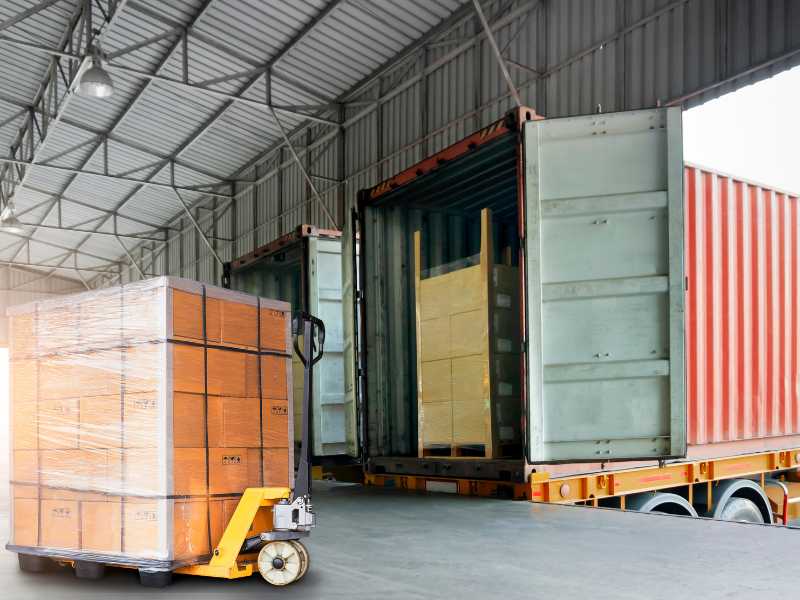
Currently, the vast majority of B2B orders are handled electronically. Business owners need to be able to speak directly to their B2B fulfillment partners as well as depend upon the technology to inform them.
What is electronic data interchange? Among logistics, supply chain, and operations professionals, EDI should be familiar to business professionals. It is the computer-to-computer exchange of business documents in a standard electronic format between business partners. We have moved on from the paper-based exchange of business documents.
The benefits are reduced cost, increased processing speed, reduced errors, and improved relationships with business partners.
The fulfillment company must be EDI compliant. Digital ordering is generally easy, but the suppliers must be EDI-compliant to ensure everyone can quickly exchange required documentation. Proper documentation must be readily available and with a full-service fulfillment company, it will be.
B2B businesses will also need excellent and responsive customer service from the fulfillment company. There are high-quality fulfillment providers that deliver quality, professional service.
What Does AMS Fulfillment Offer to B2B Clients?
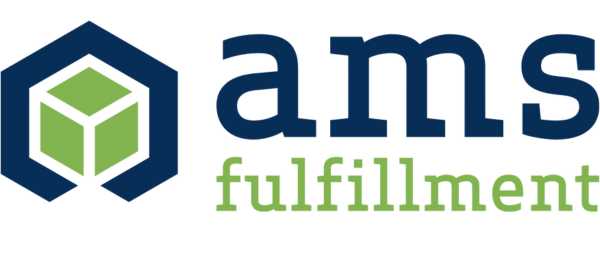
First, unlike some other companies, AMS has no percentage limit on the amount of B2B eCommerce of a company. Secondly, AMS is highly experienced in B2B fulfillment. The company has been in business for more than 20 years. Third… it is located on both coasts, near ports.
AMS is also highly experienced in B2C and D2C fulfillment, so if your company utilizes a wide range of sales channels, AMS can handle it.
There are so many plusses with AMS: an in-house technology team, specific teams that handle B2B, an excellent customer service team, and all kinds of business process services.
AMS is a fulfillment partner with its clients from onboarding to growth, through changes, to company success. AMS acts as an arm of their client’s business, so what matters to the client matters to AMS and that means all of the AMS employees. Everyone at AMS knows the value of our clients.
Now… we will mention one more thing that is becoming increasingly important – AMS is a B Corporation.
A B Corporation is a for-profit company dedicated to using business as a force for good. Consumers are increasingly concerned with reducing the environmental impact, recycling, and biodegradable packaging and they do prefer companies that make efforts to go green.
As a fulfillment company, AMS is in a unique position of success in going green by choosing packaging materials and box sizes that are earth friendly and, of course, by recycling all that we can. Reducing the use and volume of harmful waste generated through material selection, production process or product design is best for our planet — and something we encourage our clients to follow as well.
We invite you to Contact Us at AMS Fulfillment about becoming one of AMS’ B2B client partners. Our message is… yes, we are focused on your success.



